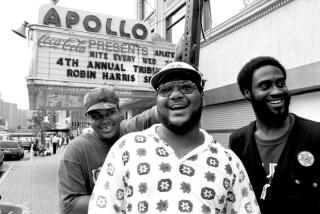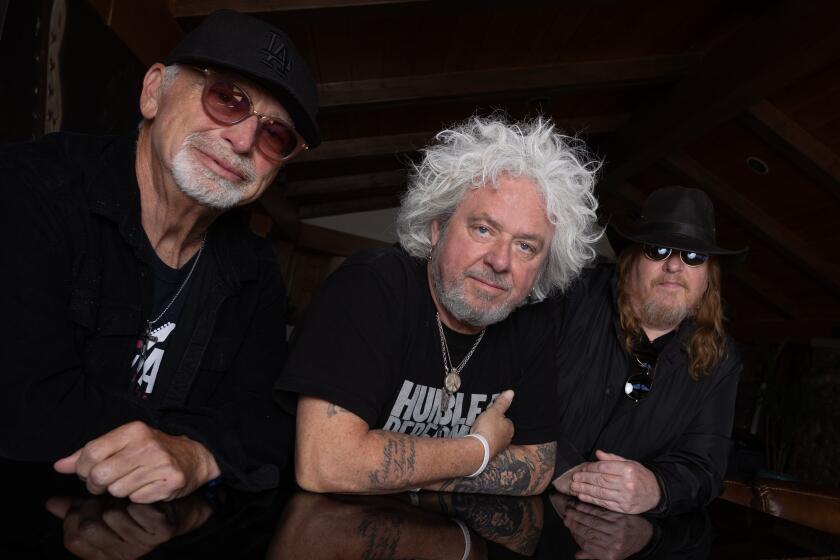Del Shannon, 55; Songwriter and Pop Star Had String of Hits in ‘60s
Del Shannon, whose melancholy hits of the early 1960s came to personify the decline of his later professional years, has been found dead in his Santa Clarita home from an apparent self-inflicted gunshot wound, police said Friday.
His wife, Bonnie, found the singer-songwriter’s body late Thursday night, said Los Angeles County Sheriff’s Deputy Roger Hom.
The balladeer on such classic hits as “Runaway,” “Keep Searchin’ (We’ll Follow the Sun)” and “Hats Off to Larry” was 55.
A .22-caliber rifle was found next to Shannon’s body in the den of his home, Hom said. He said the death was being investigated as a suicide, but the exact cause had not yet been determined pending an autopsy.
His longtime manager, Dan Bourgoise, said Shannon had been depressed lately about his new house, in which he felt disoriented, and that he also had been ill with the flu for several weeks.
But he also said Shannon was nearing completion of a new album with Tom Petty, Jeff Lynn and Mike Campbell, a member of Petty’s group, the Heartbreakers.
“Everything was rolling along quite nicely,” Bourgoise said.
Although Shannon’s performances had been limited over the last two decades, he remained a force in music as a producer and in England as a performer, where he had become a favorite about the time the Beatles were emerging.
One of the few early rockers to write his own material, Shannon soared to fame with “Runaway” after it was recorded by Detroit’s Big Top label in 1961.
At the time, he was working as Charles Westover--his given name--in a carpet store in Battle Creek, Mich., during the day and appearing regularly at the Hi Lo Club there at night.
He took the name “Shannon” from a wrestler he had met. “Del” was a contraction of the Cadillac Coupe de Ville his carpet store boss owned.
“Runaway” had originated during a jam session one night and he wrote lyrics to the song of unrequited love the next day.
The record featured Shannon’s poignant falsetto, lamenting, Wishing you were here by me, to end this misery. . . .
The words came to typify the Shannon oeuvre.
He walked alone, wrote a Times reporter who interviewed him last April. “In his songs he was deceived, falling apart, searching for a place to hide and looking over his shoulder for the stranger in town.”
Shannon followed “Runaway” (four weeks at the top of the 1961 charts) with “Hats Off to Larry,” “So Long Baby,” “Hey! Little Girl,” “Little Town Flirt,” “Handy Man,” “Keep Searchin’,” “Stranger in Town” and “Sea of Love.” The last, in 1982, was his first song to appear on the charts since “Stranger” in 1965.
In between, Shannon had been dueling with personal demons.
He fell out of favor with record producers because he had sued a succession of managers over his share of royalties. After the legal battles, recording companies shied away from him for fear they would be sued, too.
“I’d had this string of hits, but I couldn’t record,” he said last year. “I was so frustrated I’d go out and play golf in the snow.”
And he was getting drunk every day.
“When I was 20 I was drinking and when I was 30 I was drinking more and at 40 way too much.”
He got sober in 1979, he said, and two years later met Petty, who produced the album that contained “Sea of Love,” which held on to the 33rd spot in the pop charts for four weeks.
In 1986, television producer Michael Mann had Shannon, who had three children from his first marriage, re-record “Runaway” with new lyrics for the series “Crime Story.” It is also featured in the current hit film “Born on the Fourth of July.”
More recently, he performed in England and locally at Disneyland, and he had been rumored to be in line to fill the vacancy left when Roy Orbison of the Traveling Wilburys died in December, 1988.
He didn’t seem bitter, even though he acknowledged that “you’re forgotten by some people.”
“What I do now is easy,” he said last year. “I get to travel over the world, work an hour a night and get paid well.”
But conversely, he told the Associated Press recently that “this business will eat you up. If it becomes your love and you don’t have humans to love, I think you’re in a lot of trouble.”
Assessing the rocker’s career, Times critic Robert Hilburn said Friday:
“Del Shannon enjoyed his greatest success at a time in the early ‘60s when rock ‘n’ roll seemed in danger of fading from the pop scene--a time when most of the music’s key early artists had lost momentum and the pop Establishment was actively in search of more polite sounds.
“But Shannon’s best records--especially the dark, obsessive strains of ‘Runaway’ and ‘Stranger in Town’--reflected a passion and craft that not only kept the spirit of rock alive until the Beatles arrived, but which continued to inspire new generations of musicians.”
Rock music writer Steve Hochman contributed to this obituary.
More to Read
The biggest entertainment stories
Get our big stories about Hollywood, film, television, music, arts, culture and more right in your inbox as soon as they publish.
You may occasionally receive promotional content from the Los Angeles Times.










